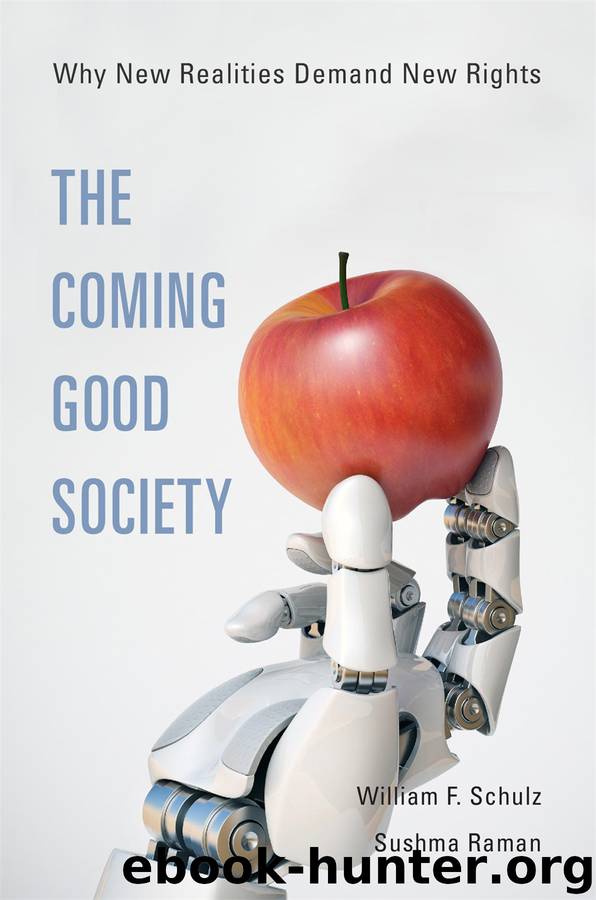The Coming Good Society by Unknown

Author:Unknown
Language: eng
Format: epub
Publisher: Harvard University Press
* * *
WHEN A THREE-YEAR-OLD BOY SCAMPERED off from his parents and fell into the gorilla pit at the Cincinnati Zoo in 2016, animal lovers were outraged that the zoo chose to save the youngster by killing Harambe, its 450-pound silverback, who was dragging the child around the pool and hovering over him. Many criticized the parents for not tending the child more carefully; others insisted the zoo could have tranquilized Harambe, who, in any case, they said, was acting protectively, not menacingly, toward the child.59 Regardless of the merits of these arguments, for our purposes the bottom line question is this: If we are forced to choose between the life of an animal, even a glorious one like a silverback gorilla, and the life of a child, which would we choose?60 Should this have been a hard choice? The zoo authorities did not apparently regard it as one; having little time for reflection, they acted quickly and resolutely.
Euthanasia is controversial for humans but “putting down” a household pet when it is suffering pain from an irreversible terminal illness is not considered remotely unethical. Quite the contrary, it is thought by most people to be merciful. If a pack of rats in an urban area were found to be the primary bearers of a disease that was highly dangerous to humans, would we not feel it incumbent upon the local government to do what it could to eliminate the rat as a vector? If we saw a dog or cat being transported in a cage inside a family car, we might object—this hypothetical assumes the pet is inside the car, not on its roof, à la Mitt Romney!—but if we saw a child being transported in a cage, we would call the authorities. Significant strides have been made in reducing the use of animals in laboratory experiments through the use of alternative methods such as in vitro cell culture and computer modeling, but if a pharmaceutical product that would save your child’s life could be developed in no other way than through lethal animal experimentation, would you not be inclined to think the tradeoff justifiable?61 And, even if we regard them all as horrendous, do we really see no difference in moral valence between the enslavement of Africans and the caging of chickens or the slaughter of Jews and the killing of cattle?
These questions are designed to point up the complexity of the animal rights question, especially when based upon the “human parallels” approach. Granted, animals are sentient creatures with many skills equal to or superior to those of some human beings (to say nothing of superior in some cases to those of all human beings, none of whom can fly like a bird or run like a jaguar). Granted, animals have suffered horrendous and often unnecessary abuse at the hands of humans. If a good society is to mean anything, it must mean that such a society would do all it reasonably could to reduce the suffering of such sentient beings.
Download
This site does not store any files on its server. We only index and link to content provided by other sites. Please contact the content providers to delete copyright contents if any and email us, we'll remove relevant links or contents immediately.
Kathy Andrews Collection by Kathy Andrews(10550)
The remains of the day by Kazuo Ishiguro(7575)
Spare by Prince Harry The Duke of Sussex(4219)
Paper Towns by Green John(4177)
The Body: A Guide for Occupants by Bill Bryson(3814)
Be in a Treehouse by Pete Nelson(3233)
Harry Potter and the Goblet Of Fire by J.K. Rowling(3074)
Goodbye Paradise(2974)
Never by Ken Follett(2905)
Into Thin Air by Jon Krakauer(2711)
The Remains of the Day by Kazuo Ishiguro(2627)
The Genius of Japanese Carpentry by Azby Brown(2614)
The Cellar by Natasha Preston(2603)
Drawing Shortcuts: Developing Quick Drawing Skills Using Today's Technology by Leggitt Jim(2537)
120 Days of Sodom by Marquis de Sade(2445)
Architecture 101 by Nicole Bridge(2356)
Machine Learning at Scale with H2O by Gregory Keys | David Whiting(2314)
The Man Who Died Twice by Richard Osman(2307)
Industrial Automation from Scratch: A hands-on guide to using sensors, actuators, PLCs, HMIs, and SCADA to automate industrial processes by Olushola Akande(2120)
